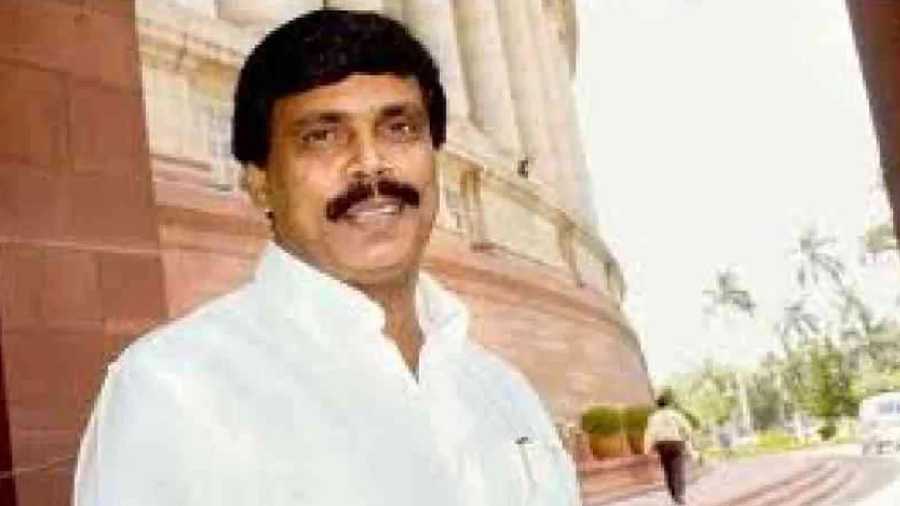The release of tainted politician Anand Mohan Singh from jail may help the JD(U)-RJD alliance in getting some support from the Rajput community, but the situation remains fluid as new caste equations emerge in Bihar ahead of the 2024 Lok Sabha polls, political experts say.
Mohan, a former MP, was released from Saharsa jail on Thursday after remaining behind bars for 15 years for killing G Krishnaiah, the then district magistrate of Gopalganj, who was beaten to death by a mob in Muzaffarpur district in 1994.
His remission of a sentence followed an amendment of the Bihar Prison Manual, whereby the restriction on early release of those involved in killing a public servant on duty was done away with.
Even as it drew flak for the Bihar government, Chief Minister Nitish Kumar has defended the move.
Political observers say it may benefit the ruling alliance electorally. However, the political realignments in the state have left the Mahagthbandhan and the main opposition BJP looking for new caste equations.
Political commentator Manikant Thakur says that this could be the second rise of community politics in Bihar, where all parties attempt to get support from communities other than their traditional voters.
"Release of Anand Mohan will definitely impact Bihar's politics. The Rajput lobby has been working on this for a long time. The RJD is not getting any additional support except the Yadav-Muslim combine. The JD(U) is realising that a section of EBC (Economically Backward Castes) has been captured by the BJP. The JD(U) was looking for some other section to come with it. Probably, the Rajput lobby will now move towards JD(U)," Thakur told PTI.
"It seems the Rajput lobby persuaded Nitish Kumar and he agreed. The issue is whether BJP's larger politics will allow the upper caste to move towards this alliance or not, that is where the dilemma is," he said.
In January, the JD(U) held an event to observe Rashtriya Swabhiman Diwas in Patna to commemorate the death anniversary of Rajput king Maharana Pratap. At the event, Kumar was greeted by chants for Mohan's release. The chief minister had assured Mohan's supporters that the government was working on it.
Thakur, however, said Mohan's influence might remain limited to the areas around Saharsa, and may not impact the prevailing caste politics of south Bihar, or the larger upper-caste voters in the state.
Mohan hails from Panchgachia village in Saharsa district and yields influence in the Kosi region, which includes Supaul and Madhepura districts.
"Some new caste equations may emerge before 2024 in Bihar. We are not sure what it would be. If RJD-JD(U) remain together, some upper caste votes may get attached to RJD due to JD(U). This is a very fluid situation. There is also an internal contradiction between RJD and JD(U), which the BJP is trying to use,” Thakur said. "This is a new turn in community politics in Bihar. This is the second rise of community politics,” he added.
DM Diwakar, a former director of the Patna-based AN Sinha Institute of Social Studies, agreed the move is political and may benefit the ruling alliance, but added it's not enough to get the support of the whole Rajput community.
"The timing of this move is important. After Raghuvansh Babu, the vacuum of votes from a particular community was there and RJD was looking for a leader from that community," said Diwakar.
In 2019, Jagdanand Singh, a renowned Rajput leader from central Bihar, became the Bihar state president of the RJD, the first upper-caste leader to hold the post.
Diwakar said Mohan's release from prison appears to be a step in that direction.
He, however, added, “They may feel community votes may get mobilized but it is not necessary. In the present-day democracy, voters don't get mobilized only on the basis of caste, unless a Robin Hood comes.” “The grand alliance can encash it, but much depends on how (other) political parties deal with this situation. The opposition will also not remain silent,” he said.
Mohan being accused of the murder of a Dalit IAS officer is another factor, and how the Dalit communities react to it remains to be seen, added Diwakar.
Asked about the social impact of the decision from the perspective of law and order, he said being released after serving a sentence is a legal right given to all citizens.
“One perspective to the situation is that it will embolden criminals, but in that case, one would need to change the legal system, because the Constitution gives criminals the right to be released after serving their sentence,” Diwakar told PTI.
Thakur too said that having a criminal background does not affect the popularity of leaders and, therefore, political parties are not concerned about their image being dented by such moves.
“Candidates having a criminal background do not impact voters. Probably what is a crime for urban voters is Robin Hooding for their support groups,” he said.
According to a report by the think-tank Association For Democratic Reforms, in the 2020 Bihar Assembly polls, around 68 per cent of winning candidates had declared criminal cases against themselves.
Except for the headline, this story has not been edited by The Telegraph Online staff and has been published from a syndicated feed.











